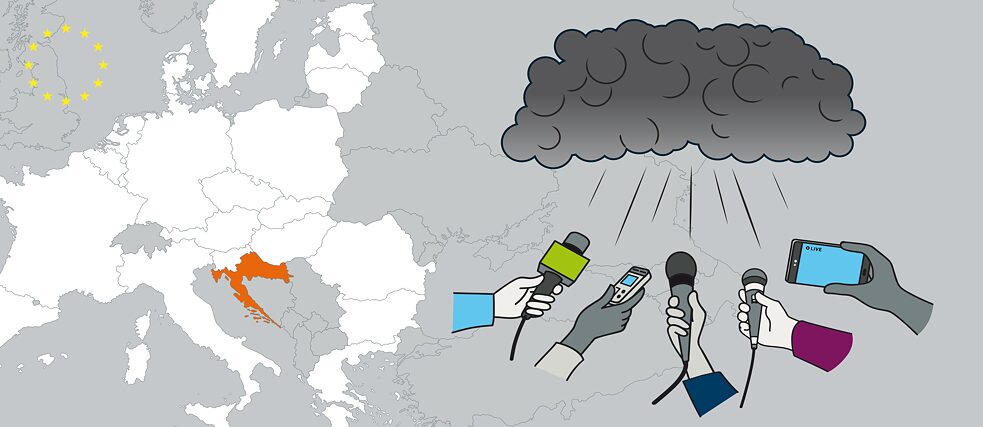Media Freedom in Croatia
Vexatious lawsuit and precarious working conditions jeopardize independent journalism

On October 28, the Croatian Journalists’ Association (HND), organised a press conference to draw the public's attention to a dozen new lawsuits against journalists and media in the country. The lawsuits were filed by high-ranking politicians and public figures - Member of Parliament Branimir Glavaš, Rector of the University of Zagreb, Damir Boras, and former Minister of Agriculture Tomislav Tolušić.
By Jelena Prtorić
Hrvoje Zovko, president of HND, qualified such lawsuits as ‘SLAPPs’ - Strategic Lawsuits Against Public Participation - whose aim is to silence and intimidate journalists by burdening them with often long and costly legal procedures. “These lawsuits’ goal is to censor journalists,” Zovko said.
In its 2020 report, media freedom watchdog organisation Reporters Without Borders ranked Croatia 59th (out of 180 countries) highlighted the fact that “defamation is criminalized and insulting ‘the Republic, its emblem, its national hymn or flag’ is punishable by up to three years in prison” and that “humiliating media content has been criminalized since 2013.”
In May 2020, HND noted that at least 905 lawsuits, filed by politicians, businessmen and other public figures against journalists and media were ongoing in the country.
“I believe that number is much higher, but not all the media responded to the HND’s survey,” said Vesna Alaburić, lawyer specialised in media law. Alaburić has defended numerous journalists and media in similar lawsuits over the years. “I have been in this business for the past 25-30 years, and I’d say that the number of lawsuits is constantly high. In many cases, the plaintiff doesn’t necessarily care if they win the case or not, but they use the lawsuit as a tool to silence a journalist or a media organisation, and dissuade them from writing about something.”
Alaburić represented the news website Telegram.hr in a recent lawsuit filed by former Minister of Agriculture Tolušić. Overall, Tolušić filed 11 lawsuits against the news websites Telegram.hr, Index.hr and Virovitica.net for publishing articles reporting about proceedings against him for misreporting the size of his property.
“In his lawsuit against Telegram.hr, Tolušić didn’t challenge the fact that he didn’t correctly represent the size of his property. But he insisted he hadn’t done so in bad faith. He basically challenged the term used in Telegram’s article,” Alaburić said. The Municipal Court in Zagreb issued a non-final ruling stating Telegram.hr must pay the Tolušić approximately 4,000 euro compensation. Alaburić plans to appeal.
“The problem in Croatia is that judges don’t consider as relevant the fact that the same person filed a number of lawsuits against the same media or that they tend to sue the media all the time. I think the courts should keep track of that, because this shows that the goal of the lawsuit isn’t to get financial compensation but rather to financially damage the media,” she said.
For many smaller, local and independent outlets, such lawsuits could mean that they’ll need to close the shop. “A compensation of 20-30.000 kuna (3-4.000 euros) doesn’t seem much, but in the current economic recession, several such lawsuits could mean the end of a media outlet,” noted Alaburić
Precarious working conditions
Even without the threat of lawsuits, financial woes and precarious working conditions have been at the heart of the Croatian media’s hardships for years. “I think that in 2008, during the global financial crisis, half of the journalists decided to leave the industry. And the industry has never fully recovered and restored its pre-crisis salary and protection levels,” said Maja Sever, TV journalist and president of Trade Union of Croatian Journalists, an association that promotes the rights of journalists and offers free legal support for its associated members.Today, the average net salary for journalists ranges from 600 -1000 euros, while average net salary in Croatia hovers around 900 euros. Sever pointed out that currently only journalists working for two media - Croatian news agency and the national broadcaster - were protected by collective agreements. Nine years ago 11 media outlets had collective agreements. Moreover, more journalists work as freelancers today, which means that they are hired and paid per project, they don’t have a guaranteed minimum income, and the employer doesn’t cover their social and health insurance.
The current coronavirus pandemic has exacerbated already precarious working conditions. In late September, the Trade Union of Croatian journalists warned that many media executives took advantage of the pandemic to reduce salaries and downsize their newsrooms. For instance, at the very beginning of the pandemic, in early April, the Croatian public broadcaster cancelled all of its contracts with freelance workers. Hanza Media, one of Croatia’s largest private media corporations, laid off 30 employees and cancelled a number of contracts with freelancers. They also cut salaries by 5-25% per cent in some of their publications. In a survey that the Trade Union of Croatian Journalists conducted in April, 28.7 percent of 164 freelance journalists surveyed had had all their assignments (and 26 percent most of the assignments) cancelled since the beginning of the pandemic.
“If we want journalists to be able to write freely and objectively, to challenge the powerful, we need to offer them some stability. Financial insecurity leads to lack of independence,” Sever said. She believes the solution is to unionise and negotiate better working conditions for all the journalists, nationwide. “Our intention is to ultimately secure a national collective agreement for all the media workers.”